外研版(2019)必修三 Unit 6 Disaster and hope Using language 课件(共31页PPT)
文档属性
| 名称 | 外研版(2019)必修三 Unit 6 Disaster and hope Using language 课件(共31页PPT) | 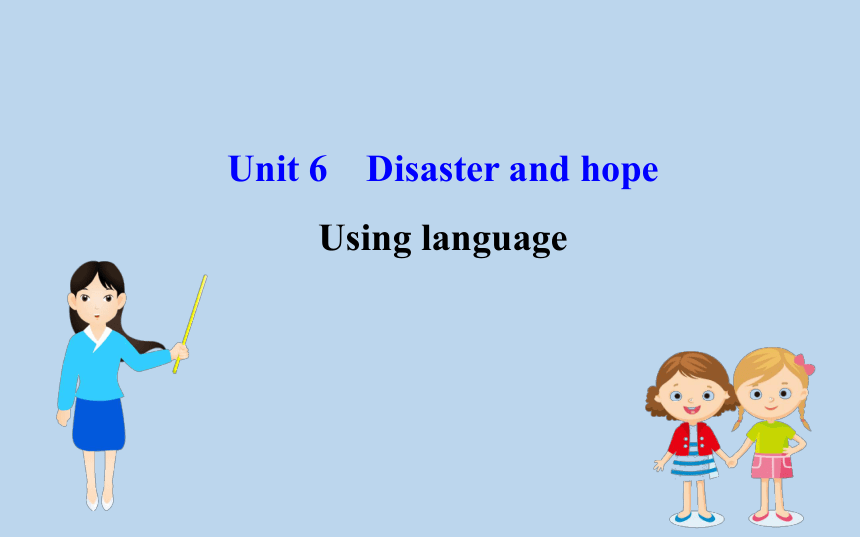 | |
| 格式 | pptx | ||
| 文件大小 | 1.4MB | ||
| 资源类型 | 教案 | ||
| 版本资源 | 外研版(2019) | ||
| 科目 | 英语 | ||
| 更新时间 | 2020-08-10 18:00:10 | ||
图片预览


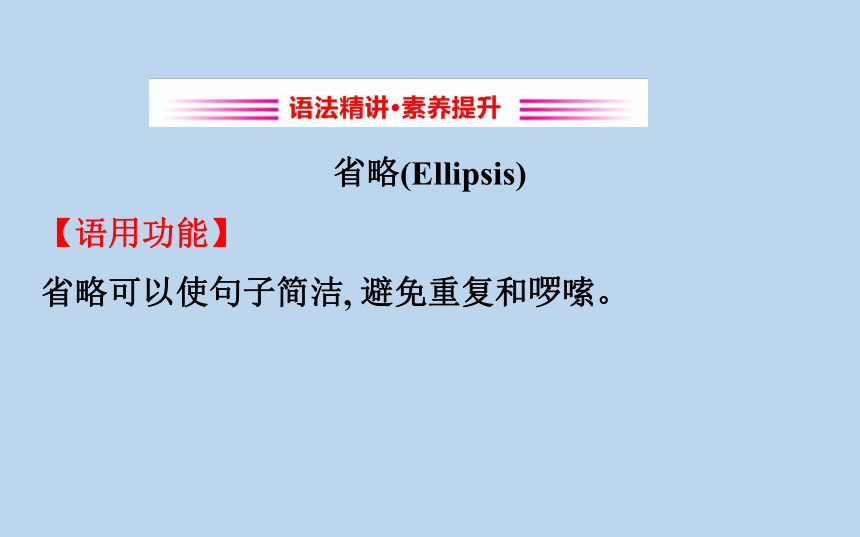
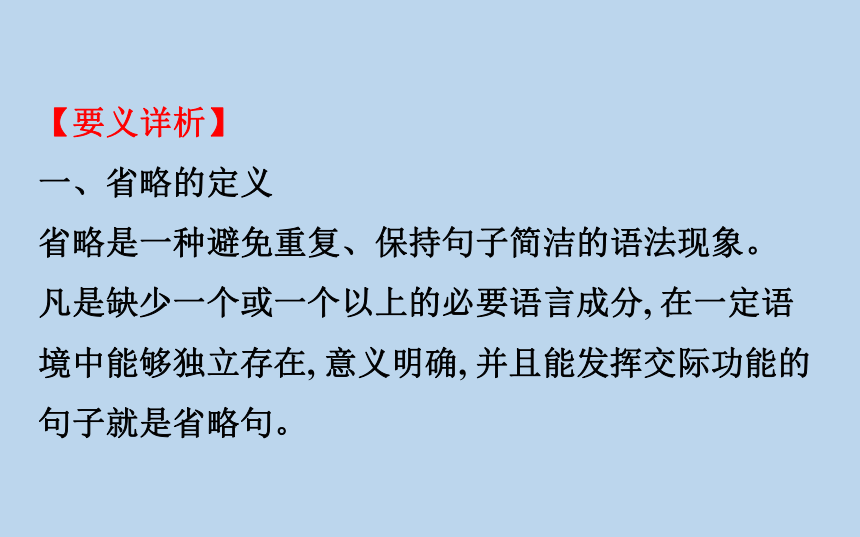

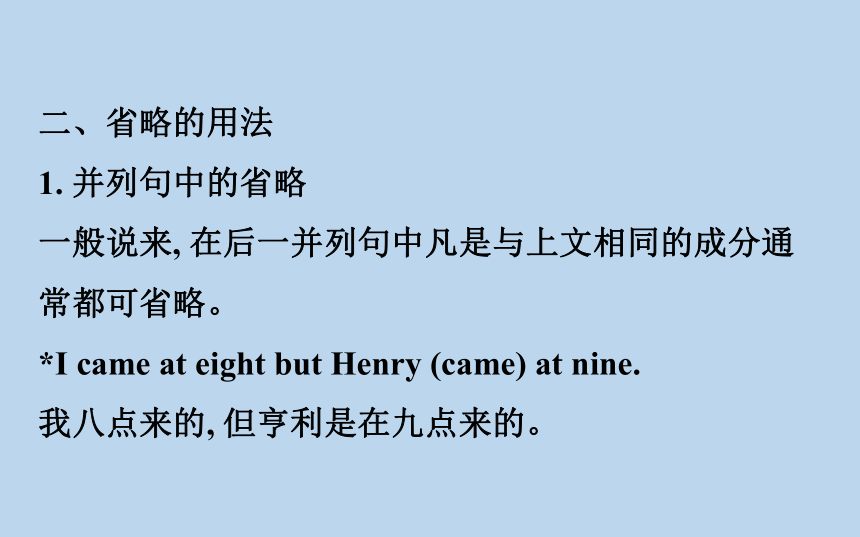
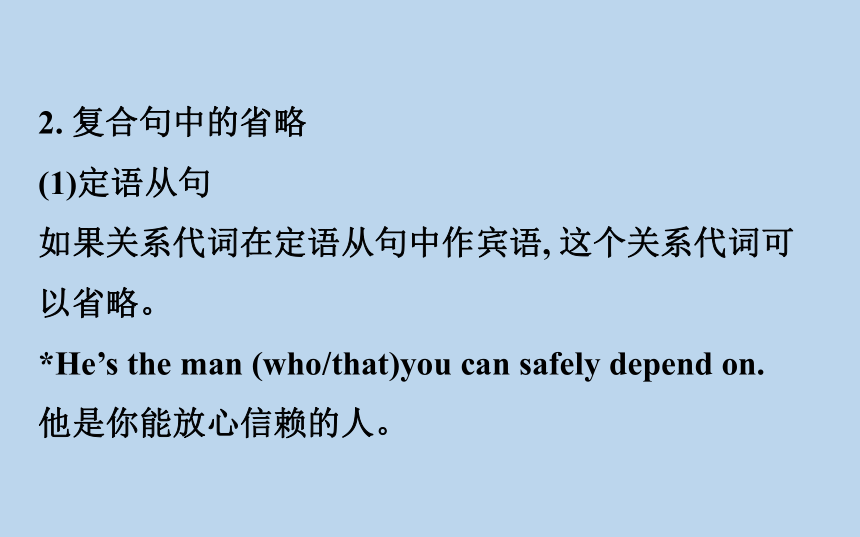
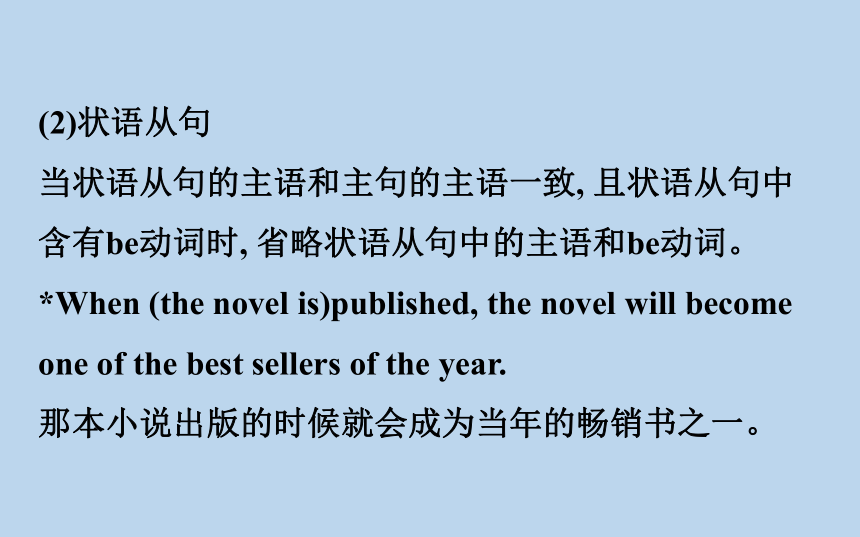

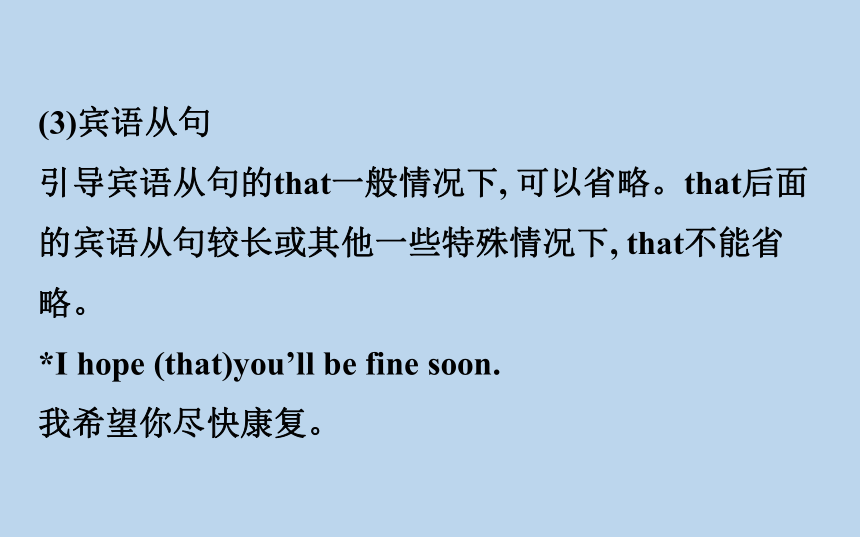
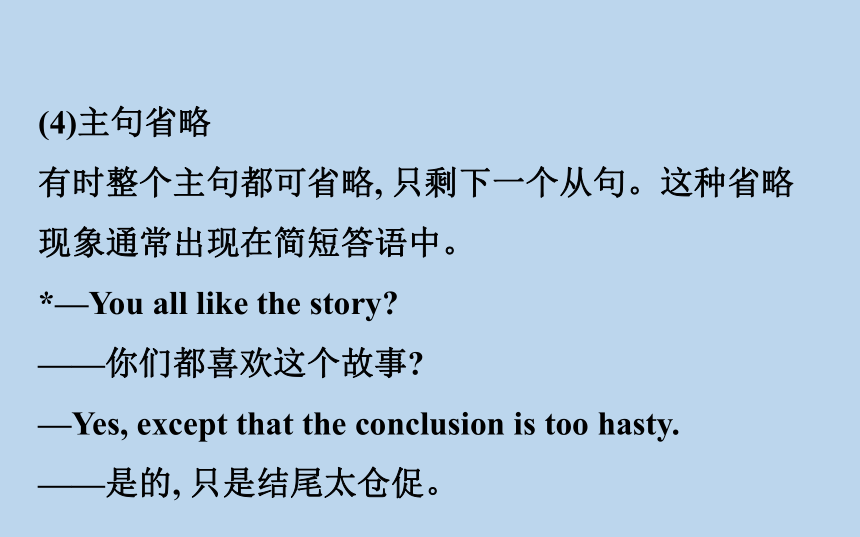
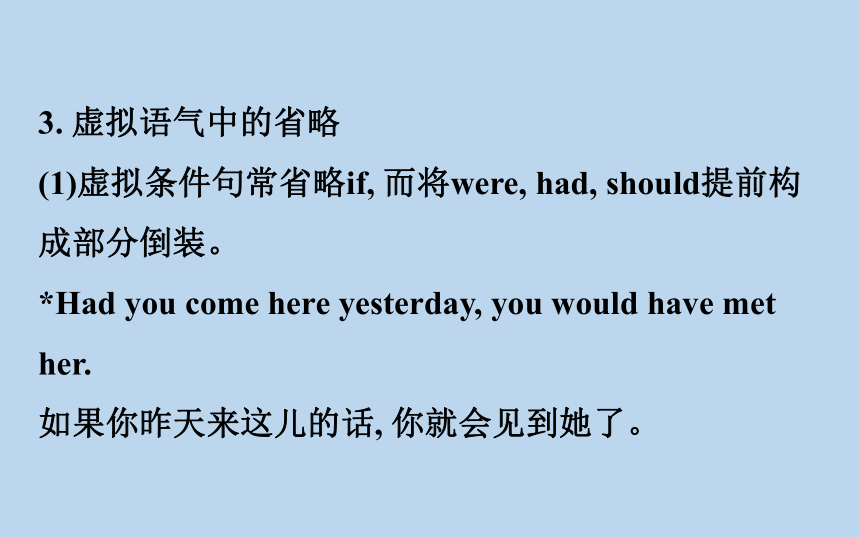
文档简介
Unit 6 Disaster and hope
Using language
Ellipsis
省略(Ellipsis)
【语用功能】
省略可以使句子简洁, 避免重复和啰嗦。
【要义详析】
一、省略的定义
省略是一种避免重复、保持句子简洁的语法现象。
凡是缺少一个或一个以上的必要语言成分, 在一定语境中能够独立存在, 意义明确, 并且能发挥交际功能的句子就是省略句。
一般说来, 只要不破坏语法结构或者引起歧义, 能省略的就应省略。省略不仅使句子结构显得紧凑, 而且也是分句和分句之间的承接纽带。
二、省略的用法
1. 并列句中的省略
一般说来, 在后一并列句中凡是与上文相同的成分通常都可省略。
*I came at eight but Henry (came) at nine.
我八点来的, 但亨利是在九点来的。
2. 复合句中的省略
(1)定语从句
如果关系代词在定语从句中作宾语, 这个关系代词可以省略。
*He’s the man (who/that)you can safely depend on.
他是你能放心信赖的人。
(2)状语从句
当状语从句的主语和主句的主语一致, 且状语从句中含有be动词时, 省略状语从句中的主语和be动词。
*When (the novel is)published, the novel will become one of the best sellers of the year.
那本小说出版的时候就会成为当年的畅销书之一。
*Although(he was)hard-working, he couldn’t earn enough to support himself.
尽管努力工作, 他的收入还是不够自己糊口。
(3)宾语从句
引导宾语从句的that一般情况下, 可以省略。that后面的宾语从句较长或其他一些特殊情况下, that不能省略。
*I hope (that)you’ll be fine soon.
我希望你尽快康复。
(4)主句省略
有时整个主句都可省略, 只剩下一个从句。这种省略现象通常出现在简短答语中。
*—You all like the story?
——你们都喜欢这个故事?
—Yes, except that the conclusion is too hasty.
——是的, 只是结尾太仓促。
3. 虚拟语气中的省略
(1)虚拟条件句常省略if, 而将were, had, should提前构成部分倒装。
*Had you come here yesterday, you would have met her.
如果你昨天来这儿的话, 你就会见到她了。
(2)在一坚持(insist), 二命令(order, command), 三建议(suggest, propose, advise), 四要求(demand, require, request, ask)等后的宾语从句中, 含这些词的派生词的其他主语从句、同位语从句、表语从句, 以及It is strange/natural/necessary/important that. . . 从句中常省略should。
*We insisted that they(should) go with us.
我们坚决要求他们和我们一起走。
*It is suggested that we (should) go to see the film.
有人建议我们去看这部电影。
4. 动词不定式的省略
(1)有些动词(词组), 如want, wish, expect, hope, would like, try, forget等后面的不定式作宾语时, 为了避免重复, 可以省略动词只保留到to, 但如果在省略的不定式结构中含有系动词be和助动词have, 这些动词就要保留。
*The boy wanted to ride his bicycle in the street, but his mother told him not to.
这个男孩想在街上骑自行车, 可他妈妈不同意。
*He is not the man he used to be.
他已经不是原来的那个样子了。
(2)两个或两个以上的不定式并列时, 第一个带to, 后面可以省去to; 但如果两个不定式表示对比关系时, 则to不可省略。
*His wish is to earn a lot of money and (to) buy his mother a big house. 他的愿望是赚很多钱给妈妈买所大房子。
(3)感官动词(词组)see, look at, hear, listen to, notice, watch等和使役动词make, let, have等的后面作宾语补足语的不定式要省略to; 但此类动词的被动语态中的to不可省略。
*I saw him enter the room just now.
刚才我看见他进了房间。
*I didn’t know who made him cry.
我不知道谁把他惹哭了。
(4)在某些句式中, 如介词but前有动词do的任何形式, 后面的不定式要省略to。
*I can do nothing but wait.
我能做的只有等待。
5. 介词的省略
(1)在英语中一些与动词、名词、形容词搭配的介词常被省略, 而只保留后面的动名词。如spend time/money(in)doing sth. ;
have difficulty/trouble(in)doing sth. ;
prevent/stop sb. (from)doing sth. 。
*I have some trouble (in) learning English.
我学英语有困难。
(2)表示时间的介词at, on和in在next, last, this, each, these, yesterday, every, tomorrow等词之前, 一般可省略。
*We have a final exam every term.
每学期我们举行一次期末考试。
6. 替代性省略
英语中, 可以使用so, not或其他手段来省略上文或问句中的一部分或整个句子。
*—Can I put my bike here?
我可以把自行车放在这儿吗?
—You’d better not. 你最好不要。
【即学活用】
把下面句子变为省略句
(1)It is a beautiful day, isn’t it?
→____________, isn’t it? ?
(2)She was poor but she was honest.
→She was poor but ______.
Beautiful day
honest
(3)—What do you think made Mary so upset?
—Losing her new bicycle made Mary so upset.
→ —What do you think made Mary so upset?
—____________________. ?
(4)When it is seen from the plane, the houses look
like tiny toys.
→__________________, the houses look like tiny toys. ?
Losing her new bicycle
Seen from the plane
(5)—Alice, why didn’t you come yesterday?
—I was going to come yesterday, but I had an
unexpected visitor.
→ —Alice, why didn’t you come yesterday?
—I ___________, but I had an unexpected visitor. ?
(6)The man that/who/whom you visited last night is
my grandpa.
→The man __________last night is my grandpa. ?
was going to
you visited
(7)If I were a teacher, I would be strict with my
students.
→_______________, I would be strict with my
students.
(8)My parents encouraged me to go to college, but I
didn’t want to go to college.
→My parents encouraged me to go to college, but I
_____________. ?
Were I a teacher
didn’t want to
(9)—Do you think he is a good student?
—I don’t think he is a good student.
→ —Do you think he is a good student?
—I ________. ?
(10)She was heard to sing last night.
→I _____________last night. ?
think not
heard her sing
Activity 1: Look at the sentences
and compare them
What has been left out in sentences (a) and (b)?
Why does the author leave them out?
Sentence (a) leaves out “lines”.
Sentence (b) leaves out “it is”.
To avoid repeating the word or expression that is too obvious and make the sentences more concise.
Activity 2
Find out what words have been removed before or after the underlined words.
its ways (to forecast the weather)
dry period (that’s on the way)
more loudly (than usual)
(look) for birds
when and where (something bad is going to happen)
Activity 3: Remove words from the news report to make it more concise
The 8.1 magnitude earthquake that hit Nepal on 25 April 2015, was one of the worst earthquakes in history. On hearing the news, China was quick to start organising emergency aid.
International rescue teams soon began to arrive in the country. Amongst all the international heavy rescue teams, the China International Search and Rescue Team(CISAR) was the first international heavy rescue team to arrive. Consisting of 62 people, it not only included rescuers and medical staff, but also included earthquake experts. By early May, emergency aid worth 9.7 million US dollars had been donated by China, with a further round of emergency aid to follow.
Thank you!
Using language
Ellipsis
省略(Ellipsis)
【语用功能】
省略可以使句子简洁, 避免重复和啰嗦。
【要义详析】
一、省略的定义
省略是一种避免重复、保持句子简洁的语法现象。
凡是缺少一个或一个以上的必要语言成分, 在一定语境中能够独立存在, 意义明确, 并且能发挥交际功能的句子就是省略句。
一般说来, 只要不破坏语法结构或者引起歧义, 能省略的就应省略。省略不仅使句子结构显得紧凑, 而且也是分句和分句之间的承接纽带。
二、省略的用法
1. 并列句中的省略
一般说来, 在后一并列句中凡是与上文相同的成分通常都可省略。
*I came at eight but Henry (came) at nine.
我八点来的, 但亨利是在九点来的。
2. 复合句中的省略
(1)定语从句
如果关系代词在定语从句中作宾语, 这个关系代词可以省略。
*He’s the man (who/that)you can safely depend on.
他是你能放心信赖的人。
(2)状语从句
当状语从句的主语和主句的主语一致, 且状语从句中含有be动词时, 省略状语从句中的主语和be动词。
*When (the novel is)published, the novel will become one of the best sellers of the year.
那本小说出版的时候就会成为当年的畅销书之一。
*Although(he was)hard-working, he couldn’t earn enough to support himself.
尽管努力工作, 他的收入还是不够自己糊口。
(3)宾语从句
引导宾语从句的that一般情况下, 可以省略。that后面的宾语从句较长或其他一些特殊情况下, that不能省略。
*I hope (that)you’ll be fine soon.
我希望你尽快康复。
(4)主句省略
有时整个主句都可省略, 只剩下一个从句。这种省略现象通常出现在简短答语中。
*—You all like the story?
——你们都喜欢这个故事?
—Yes, except that the conclusion is too hasty.
——是的, 只是结尾太仓促。
3. 虚拟语气中的省略
(1)虚拟条件句常省略if, 而将were, had, should提前构成部分倒装。
*Had you come here yesterday, you would have met her.
如果你昨天来这儿的话, 你就会见到她了。
(2)在一坚持(insist), 二命令(order, command), 三建议(suggest, propose, advise), 四要求(demand, require, request, ask)等后的宾语从句中, 含这些词的派生词的其他主语从句、同位语从句、表语从句, 以及It is strange/natural/necessary/important that. . . 从句中常省略should。
*We insisted that they(should) go with us.
我们坚决要求他们和我们一起走。
*It is suggested that we (should) go to see the film.
有人建议我们去看这部电影。
4. 动词不定式的省略
(1)有些动词(词组), 如want, wish, expect, hope, would like, try, forget等后面的不定式作宾语时, 为了避免重复, 可以省略动词只保留到to, 但如果在省略的不定式结构中含有系动词be和助动词have, 这些动词就要保留。
*The boy wanted to ride his bicycle in the street, but his mother told him not to.
这个男孩想在街上骑自行车, 可他妈妈不同意。
*He is not the man he used to be.
他已经不是原来的那个样子了。
(2)两个或两个以上的不定式并列时, 第一个带to, 后面可以省去to; 但如果两个不定式表示对比关系时, 则to不可省略。
*His wish is to earn a lot of money and (to) buy his mother a big house. 他的愿望是赚很多钱给妈妈买所大房子。
(3)感官动词(词组)see, look at, hear, listen to, notice, watch等和使役动词make, let, have等的后面作宾语补足语的不定式要省略to; 但此类动词的被动语态中的to不可省略。
*I saw him enter the room just now.
刚才我看见他进了房间。
*I didn’t know who made him cry.
我不知道谁把他惹哭了。
(4)在某些句式中, 如介词but前有动词do的任何形式, 后面的不定式要省略to。
*I can do nothing but wait.
我能做的只有等待。
5. 介词的省略
(1)在英语中一些与动词、名词、形容词搭配的介词常被省略, 而只保留后面的动名词。如spend time/money(in)doing sth. ;
have difficulty/trouble(in)doing sth. ;
prevent/stop sb. (from)doing sth. 。
*I have some trouble (in) learning English.
我学英语有困难。
(2)表示时间的介词at, on和in在next, last, this, each, these, yesterday, every, tomorrow等词之前, 一般可省略。
*We have a final exam every term.
每学期我们举行一次期末考试。
6. 替代性省略
英语中, 可以使用so, not或其他手段来省略上文或问句中的一部分或整个句子。
*—Can I put my bike here?
我可以把自行车放在这儿吗?
—You’d better not. 你最好不要。
【即学活用】
把下面句子变为省略句
(1)It is a beautiful day, isn’t it?
→____________, isn’t it? ?
(2)She was poor but she was honest.
→She was poor but ______.
Beautiful day
honest
(3)—What do you think made Mary so upset?
—Losing her new bicycle made Mary so upset.
→ —What do you think made Mary so upset?
—____________________. ?
(4)When it is seen from the plane, the houses look
like tiny toys.
→__________________, the houses look like tiny toys. ?
Losing her new bicycle
Seen from the plane
(5)—Alice, why didn’t you come yesterday?
—I was going to come yesterday, but I had an
unexpected visitor.
→ —Alice, why didn’t you come yesterday?
—I ___________, but I had an unexpected visitor. ?
(6)The man that/who/whom you visited last night is
my grandpa.
→The man __________last night is my grandpa. ?
was going to
you visited
(7)If I were a teacher, I would be strict with my
students.
→_______________, I would be strict with my
students.
(8)My parents encouraged me to go to college, but I
didn’t want to go to college.
→My parents encouraged me to go to college, but I
_____________. ?
Were I a teacher
didn’t want to
(9)—Do you think he is a good student?
—I don’t think he is a good student.
→ —Do you think he is a good student?
—I ________. ?
(10)She was heard to sing last night.
→I _____________last night. ?
think not
heard her sing
Activity 1: Look at the sentences
and compare them
What has been left out in sentences (a) and (b)?
Why does the author leave them out?
Sentence (a) leaves out “lines”.
Sentence (b) leaves out “it is”.
To avoid repeating the word or expression that is too obvious and make the sentences more concise.
Activity 2
Find out what words have been removed before or after the underlined words.
its ways (to forecast the weather)
dry period (that’s on the way)
more loudly (than usual)
(look) for birds
when and where (something bad is going to happen)
Activity 3: Remove words from the news report to make it more concise
The 8.1 magnitude earthquake that hit Nepal on 25 April 2015, was one of the worst earthquakes in history. On hearing the news, China was quick to start organising emergency aid.
International rescue teams soon began to arrive in the country. Amongst all the international heavy rescue teams, the China International Search and Rescue Team(CISAR) was the first international heavy rescue team to arrive. Consisting of 62 people, it not only included rescuers and medical staff, but also included earthquake experts. By early May, emergency aid worth 9.7 million US dollars had been donated by China, with a further round of emergency aid to follow.
Thank you!
